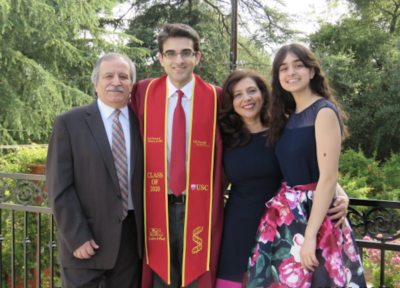Ali Sahimi, inspired by his family’s medical history and record of academic achievement, encountered “a wellspring of opportunity” and “multiple levels of mentoring” at USC.
By Cristine Hall
It seems like it was a given that Ali Sahimi would pursue a degree in health sciences at USC. His mother is a physician who works at the H. Claude Hudson Comprehensive Health Center in Los Angeles. His father is a professor of chemical engineering and materials science who holds the NIOC Chair in petroleum engineering at USC. As a child, Sahimi grew up reading science-related picture books and, as a teen, the many medical journals laying around the house.
But Sahimi ended up doing so much more. In his fourth year, he entered a progressive degree program, earning two bachelor’s degrees—one in neuroscience and one in health promotion and disease prevention—and a master’s degree in applied biostatistics and epidemiology. He landed part-time jobs as an undergraduate and graduate researcher under multiple mentors in two different labs, and he worked at Share a Meal USC, a nonprofit program of Khalsa Peace Corps that makes homemade meals for those who are homeless.
“We always talk about how USC has strong social networks and strong academics, but we underestimate how much of a wellspring of opportunity USC is even in the places where you would not imagine it,” said Sahimi, who begins an MD-PhD program at New York University this summer. “Through most of my undergraduate career, I had never heard of a progressive master’s degree. The only reason I heard about it was by someone I met.”
Sahimi matriculated as a student in health promotion and disease prevention in 2016 with an eye toward a career in medicine. He added his second major for neuroscience soon after, partly inspired by his grandparents’ experience with neurodegenerative disorders including Alzheimer’s and TIA-related Dementia.
When he was incoming sophomore studying how disease starts in ALS while working in the Ichida Lab-USC STEM CELL, he met Kim Staats, PhD, a researcher affiliated with Keck School of Medicine of USC, who introduced him to the world of genetics and big data research. She suggested he consider getting a master’s degree in biostatistics through USC’s progressive degree program, which allows students to apply their undergraduate coursework toward completion of a master’s degree.
‘Multiple levels of mentoring’
Sahimi received tremendous guidance and support once he was introduced to the faculty in his field in the Department of Population and Public Health Sciences.
Wendy Mack, PhD, a professor of Population and Public Health Sciences and co-director of the department’s division of biostatistics graduate programs, walked him through the entire process and helped him work out a schedule. In his senior year, he moved to Conti Lab, which performs research in genetic and environmental epidemiology with an interest in factors across populations.
“Ali has been a wonderful student with an incredibly diverse set of skills at this early stage of his career,” said David Conti, PhD, professor of Population and Public Health Sciences, Kenneth T. Norris, Jr. Chair in Cancer Prevention, and associate director for data science at USC Norris Comprehensive Cancer Center. “His experience is a great example of multiple levels of mentoring and collaboration within a research group.”
The Population and Public Health Sciences mentoring team worked to integrate Ali into its group and broaden his knowledge in genetics and prostate cancer by having him attend and present in weekly group meetings. Sahimi met with Conti biweekly to get big-picture feedback and discuss next steps of his research. He met weekly with Burcu Darst, PhD, a postdoctoral scholar and research associate in the Center for Genetic Epidemiology, to make sure he understood project goals and potential implications, to review the coding scripts and prepare for manuscripts and presentations.
“Ali has been great to work with for many reasons but particularly because he is genuinely interested in the research he’s been leading and good at grasping challenging new concepts,” Darst said. “Several components of his project have challenging computational demands, and he has been great at understanding those demands and developing his skills to effectively address them.”
Squeezing in 16 units a semester on top of lab time and volunteer work at Share a Meal was a juggling act that involved careful planning and some sacrifice, especially in the area of sleep. But it was all worth it.
“A great thing about USC is that you should really keep your eyes and ears open because any little bit of information could open a whole new pathway for you that you may not have imagined,” he said.

